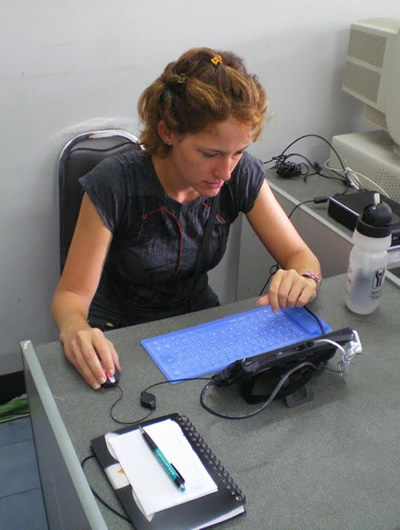How to Live and Work Abroad Freelancing on the Web
Find or Create Jobs That Allow for Location-Independence
By Nora Dunn
Some resources updated 8/23/2023
by Transitions Abroad. Originally published 8/2008.

|
|
How would you like a hammock for an office? Location-independent living and working is an option.
|
Many people dream of a life working abroad, with scarcely a care in the world besides finding an Internet connection. Visions are conjured of lounging on exotic beaches with a frozen drink with a pink umbrella in one hand and a laptop in the other.
That life is not as hard to achieve as it might seem at first blush. Since 2007, I have traveled the world as a freelancer, needing only an internet connection to pave the way. I do not fuss with work visas and the associated mind-numbing red tape and cost; a tourist visa suffices since my income is earned "offshore," and I am generally considered a benefit to local economies by bringing in outside money and spending it.
Contrary to popular opinion, you do not have to be a Web designer or programmer to make money online. Anyone can freelance on the Web with research, ingenuity, and tenacity. Here are some tips to make your transition abroad easier.
Finding Your Own Location-Independent Career
Editor's Note (8/2023): We should elaborate upon the often-overlapping distinctions between being a digital nomad, a remote worker, and a location-independent freelancer.
• A freelancer is a person who pursues a profession without a long-term commitment to any one employer. Freelancers tend to work in the creative, skilled, or service sector, such as in film, art, design, editing, copywriting, proofreading, media, marketing, music, journalism, tourism, consulting, website development or design, computer programming, photography, language translation, tutoring, and many more.
• A digital nomad is a location-independent worker who earns a living through remote work but at a location or locations they choose.
By some estimates, there are up to 35 million digital nomads worldwide, 50% from the U.S.
• A remote worker is someone who works remotely. They could be a freelancer, an independent business owner, or someone working on a remote virtual team.
• A virtual job is a job that can be done from anywhere with an internet connection. It is a type of remote work that allows employees to work from home or any other location.
One of the differences between digital nomads and remote workers is that digital nomads travel as they work and do not have a permanent residence in any country.
These ways of working go back many years at this point in history, such that they are becoming fundamentally evergreen with new resources available daily. Recently, all such forms of making a living abroad or at home, usually but not always while traveling frequently, have increased substantially.
Reading "The 4-Hour Workweek" — a classic book by Tim Ferriss written 15 years ago, and subsequently turned into a website — is a great way to get the creative juices flowing to refocus your life and achieve your dream of living abroad. Take notes as you read because while you learn of ways to start and run internet businesses and manage them from abroad, you are sure to come up with a few ideas of your own. You will also learn about practical techniques for freelancing abroad, such as outsourcing (which we will get to shortly).
A fellow with a background in law contacted me, lamenting that he would love to live abroad but needs to learn how to manage a legal practice without maintaining a physical presence. Together we brainstormed and came up with several ideas to utilize his area of expertise online, from paid subscription newsletters to legal coaching, and even writing e-books and managing affiliate sales
Research: Research is your first key to learning where your skills will fit into the online world. Learning the art of surfing for opportunities will be your first step in navigating the Web and learning
how to become involved.
Subscribe to newsletters, join forums, and engage in various forms of social media in your general interest or expertise. When I started as a writer, I could barely define "HTML," much less determine my market or how to get paid. By surfing and subscribing to informational newsletters, I slowly learned the language of internet freelancing, became aware of publishers looking for content, and discovered how to write queries and structure article submissions. My first byline came from one of these newsletters, tipping me off to an editor requesting new content about the city where I then lived.
Ingenuity: As with most businesses, a little ingenuity goes a long way. Finding a gap in what is currently being offered and filling that need is a great way to create a stream of income and even a small monopoly in your niche. Combined with Research, Ingenuity may be your ticket to a better income than you ever dreamed of earning. Without Research, Ingenuity could be a good idea without a market or executable plan.
Tenacity: Once you have a plan, sticking with it will be the hardest — yet most crucial — step of the process. Be prepared to fall a few times; pick yourself up and keep going, acknowledging each road bump as part of the journey up the learning curve. Some ventures will succeed, and others will flounder. The web is a constantly evolving entity — what worked yesterday may be old news today.
Technology is Your Friend
Susie runs a coaching business, and if you did not know any better, you would say she had an office with a view of a big city, a receptionist, a dedicated assistant, and a stream of clients lining up out the door. And although Susie has streams of clients, they have yet to come to her door. She has neither an office, nor a desk for her receptionist or assistant. Instead, she utilizes technology to her benefit and runs her enterprise from the comfort of her home.
Susie has a toll-free number for anybody in the world to call. When they call, the automatic attendant prompts clients to direct their call to either Susie or her assistant, who handles scheduling. When the phone rings on the assistant's "desk," the assistant will often answer — from the comfort of her own home eight hundred miles away, where she works part-time, freelancing for Susie as a virtual assistant.
Susie conducts client meetings using web tools like email, online conferencing, and Skype. There is no need to cut Susie a check for her services; she will send you an online invoice through Paypal, which you can easily pay with your credit card, debit card, bank transfer, or your Paypal account balance.
By utilizing technology to your benefit, you can run a very professional organization without letting on that you may be sitting on a beach sipping pina coladas all the while.
Take Your Time
It took me one year of dedicated work (three to five hours/daily) to reach the point where my online freelancing income could pay for much more than a cup of coffee. As I started from scratch, the research process was laborious and absorbed a giant chunk of time. The good news was that I enjoyed every minute of it, so it was no hardship.
However, if you have already quit your job and are boarding that airplane imminently, plan to live off some reserves for the initial set-up period. How quickly you will become solvent depends mainly on your area of expertise and existing knowledge of how to translate it into a stream of online income.
Supplementary Income
Not only might you need some reserves to cover your expenses while you kick-start your freelancing business, but even once you produce income, you may only be able to support yourself partially. Much of this depends on where in the world you are and how lavishly you choose to live.
Many parts of Southeast Asia are popular for those living abroad and web freelancing. Living costs are minimal, and the Internet is widely available in most urban areas. Living abroad in Europe or North America may be more of a challenge with a considerably higher cost of living. Combine this with a nagging desire to spend and accumulate like everybody else, and I found that living in Western countries is most challenging to keep expenditures down and in line with my "Professional Hobo" lifestyle.

|
|
Southeast Asia is a popular place to set up shop as a digital nomad to enjoy a low cost of living in lovely settings.
|
I tend to supplement my online income by volunteering in trade for accommodations (this is called Caretaking). In so doing, my online freelancing income only needs to support incidental expenses such as food, transportation, and recreation. And as such, I can proudly say I am a solvent (albeit frugal) Web Freelancer.
Traveling with a Partner?
You will face new challenges if you are venturing abroad with a partner, friend, or family member. Can they freelance abroad too? How about arranging with their boss to work remotely? Or do they have skills that are in demand in the locale you wish to live such that obtaining a work visa would be suitable? And will they feel secure living on a variable online income? You must have these conversations (and many more) with your travel partner to ensure you are both on the same page–before you leave and discover any attitude differences the hard way.
Freelancing: Multi-Tasking at its Best
The concept of freelancing is interesting: You work for yourself, yet you answer to multiple bosses. You choose your work opportunities (sometimes they choose you). Although you can control your working conditions, there will be times when you are juggling four simultaneous projects, all with looming deadlines and clients/bosses who are less than pleasurable to deal with.
Freelancing is an art for which you must maintain organization, consistently keep promises, follow up on leads, and produce top-quality results for your clients. Although the internet may initially appear to be a cavernous world looming before you, it is not as big as you may think. A tarnished reputation can be viral in the online community, and the adage that "any publicity is good publicity" does not always fly.
As an Internet freelancer in any industry, satisfying clients is not your only job. Here are some of the constant tasks that will be on your list:
-
Online marketing
-
Website design, development, and maintenance
-
Networking and following up with clients
-
Reading industry newsletters
-
Researching to stay on top of changing trends
-
SEO (search engine optimization) tasks and techniques
-
Social media consulting
-
Providing and refining your specialized service
You Cannot Speak Internet? Outsource!
I dabble in photography as well as writing. And although I have a few photos for sale on stock photography websites, I only occasionally have the time or Photoshop expertise to submit photos regularly. So what do I do? I outsource!
Inspired by The 4-Hour Workweek, I send my virtual assistant photos, and she post-processes them and uploads them to my stock websites. As such, I do what I do best — take interesting photographs. She takes care of the rest (which would take me too long to do on my own), and I consequently enjoy a passive stream of income from the sale of my photos.
If the web is a foreign and scary entity for you, you may not have to jump in with both feet and learn to speak in internet codes to be a successful online freelancer. Identify your strengths and capitalize on those while you outsource the rest to somebody else who can do the job in a fraction of the time — ultimately, a fraction of the cost.

|
|
With an internet connection, I can freelance from anywhere in the world. Photo by Nora Dunn.
|
The Power of Your Words
Because you live abroad and your clients could be thousands of miles away, your main mode of communication will be the written word. Without the ability to read body language or hear vocal lilts, you must religiously adhere to the code of web communication: Do not send an email when you are angry, proofread everything, and don't convey double entendres, irony, or mixed messages — someone will most likely take your words the wrong way. Be explicit and concise; your words will do your work for you.
Balancing Work and Play on the Road
The biggest challenge to anybody living abroad and freelancing on the web is creating a good work/life balance. I have been so absorbed in my work at times that I have wondered why I was abroad — I never saw the outside of my room. Other times have seen me traveling to my heart's content, only to pause, become completely overwhelmed with my inbox and the associated work involved, and wonder if the time off was even worth it.
Creating a balance between work and play is an art form that applies to all of us, whether or not we live abroad. But when you live on the road, call the shots with your business, and have a wealth of opportunities, emphasizing balance is paramount.
Achieve that balance, and you can enjoy the best of everything: Traveling the world, living abroad, and writing your own paychecks by freelancing on the web.
|
For More Information on being a Digital Nomad
Want to learn more? Look to the experts in your field! Find a mentor and learn from them. You may even discover a joint business opportunity.
Read The 4-Hour Workweek by Tim Ferriss for inspiration and insights.
Another option is to teach English online from the location you choose, as offered by this successful long-term teacher and expat in his course "The Ultimate Guide to Teaching English Online!”
Research Ideas:
-
Conduct a Google search for your business idea and see who is doing it. Find at least three examples of those businesses, subscribe to their newsletters, and keep checking in to
see how they operate.
-
Look for associations that can help you. Scour their sites, join if you see the benefit (do not spend a fortune on memberships until you are certain what you will get from it), and subscribe to their
free newsletters.
-
Network. Put your message or request for help out there, participate in industry-related forums (a great way to quickly create an online presence), and lurk social networking sites (not too much
though, as such sites can be a time-consuming and distracting trap).
Virtual Assistants and Marketing:
-
Upwork connects online freelancers with people who need their services. Need an assistant? Post a project and accept bids for the job, awarding
to the best candidate. Need work? Create a profile and start bidding on projects.
-
Craigslist and other classified websites have areas for job postings where you can find your next assistant and job.
|
Nora
Dunn is The
Professional Hobo: a woman who sold everything
she owned (including a busy financial planning practice
in Canada) in 2006 to embrace her dreams of full-time
travel which has taken her to over 60 countries. Nora is a professional speaker, podcaster, and the author of "How to Get Free Accommodation Around The World" and "Tales of Trains, Where The Journey is The Destination."
|



